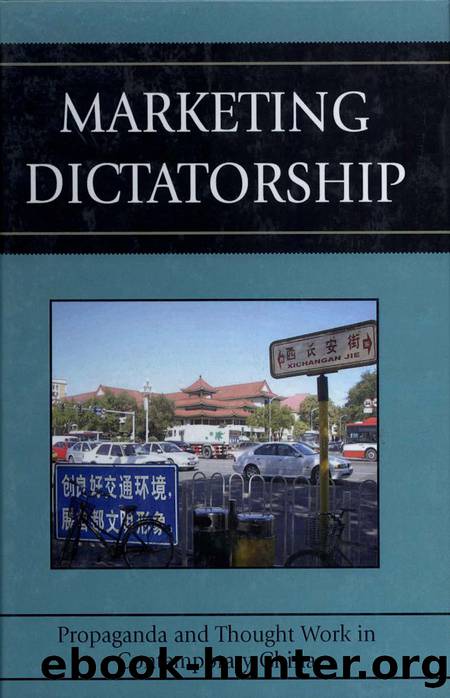Marketing Dictatorship by Brady Anne-Marie;

Author:Brady, Anne-Marie;
Language: eng
Format: epub
ISBN: 4455814
Publisher: Rowman & Littlefield Unlimited Model
Rule by Law
Since 1989, the Chinese government has been under increasing international and domestic pressure to introduce ârule of lawâ (fazhi, or yifa zhiguo). In the Mao era, the Party ruled by political campaign; law courts and lawyers had a very fettered role. The Ministry of Justice was abolished in 1959. Although it was reestablished in 1979, in the current period the Party still maintains a heavy hand over the legal process. In recent years, China has joined a number of international organizations which require the country to bring its legal and administrative systems in line with international norms. Rather than resisting, from the early 1990s the government has, to a limited extent, actually embraced the opportunity. In Chinese yifa zhiguo has the dual meaning of to ârule by law.â Since Party control over the legal system has not been de-linked in recent years, this is the effective meaning of ârule of law,â a means to give extra power to the Party-State rather than empower citizens.
âRule by lawâ (fazhi) is a buttress to the CCPâs traditional system of ârule by individualsâ (renzhi); the system which relied on the nomenklatura to maintain Party control over Chinese society. Reliance on the nomenklatura meant that the system was more prone to factional struggle and that there was more likelihood of resistance to central policies if local level leaders disagreed. Rule by law is more neutral and binding. From 1992, ârule by lawâ was introduced into Chinaâs propaganda system as a new approach to control.92 This has lead to the creation of a vast new body of laws. In the process, China acquires status internationally by appearing to comply with international norms at the same time as gaining a useful new weapon to strengthen controls over the propaganda sector. Local and national regulations in the propaganda system are regarded as a backup to national laws.93
Chinaâs new laws have been described as a new âweaponâ for CCP cadres to manage national affairs.94 Hence when the State promotes awareness of the law in China it is in order to create more obedient citizenry, it is not a means for Chinese citizens to gain more rights. Laws unrelated to media matters are being used as a means to control the propaganda system. An example of this is the crackdown in 2003-4 on the Guangdong-based, but nationally influential paper, Southern Metropolis Daily, which had established a strong reputation from the late 1990s. The paper followed a tabloid format, focusing on sports, cars, and other popular topics as well as reporting on some sensitive local issues. However it was the paperâs reporting of the death in custody of a young university graduate who had been beaten to death while under temporary detention which most offended local officials. Though Central authorities responded to the national outcry over the death by repealing the temporary detention law, local officials were extremely embarrassed by the paperâs coverage and sought revenge. A number of the paperâs senior leaders were arrested on, what many commentators say, were trumped up corruption charges.
Download
This site does not store any files on its server. We only index and link to content provided by other sites. Please contact the content providers to delete copyright contents if any and email us, we'll remove relevant links or contents immediately.
| Central Asia | Southeast Asia |
| China | Hong Kong |
| India | Japan |
| Korea | Pakistan |
| Philippines | Russia |
The Rape of Nanking by Iris Chang(3518)
The Sympathizer by Viet Thanh Nguyen(3487)
World without end by Ken Follett(3008)
Ants Among Elephants by Sujatha Gidla(2925)
Blood and Sand by Alex Von Tunzelmann(2610)
Japanese Design by Patricia J. Graham(2557)
City of Djinns: a year in Delhi by William Dalrymple(2137)
Inglorious Empire by Shashi Tharoor(2102)
Foreign Devils on the Silk Road: The Search for the Lost Treasures of Central Asia by Peter Hopkirk(2056)
In Order to Live: A North Korean Girl's Journey to Freedom by Yeonmi Park(2055)
Tokyo by Rob Goss(2018)
India's Ancient Past by R.S. Sharma(1988)
India's biggest cover-up by Dhar Anuj(1985)
The Great Game: On Secret Service in High Asia by Peter Hopkirk(1962)
Tokyo Geek's Guide: Manga, Anime, Gaming, Cosplay, Toys, Idols & More - The Ultimate Guide to Japan's Otaku Culture by Simone Gianni(1947)
Goodbye Madame Butterfly(1937)
The Queen of Nothing by Holly Black(1757)
Living Silence in Burma by Christina Fink(1731)
Batik by Rudolf Smend(1721)
